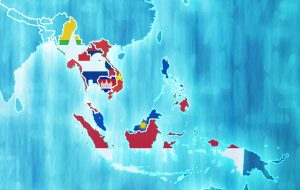The digital economy has been a recent focal point of cooperation between the European Union (EU) and the Association of Southeast Asian Nations (ASEAN). In 2020, ministers from member states of both blocs formulated a joint statement on connectivity, which emphasized the importance of digital connectivity. In the Plan of Action to Implement the ASEAN-EU Strategic Partnership (2023-2017), which was issued earlier this year, the two regional organizations reaffirmed their commitment to cooperate in the realm of the digital economy.
Moreover, at a historic ASEAN-EU Commemorative Summit that concluded on December 14, leaders from ASEAN and EU nations committed to promoting cooperation in digital transition. On the sidelines of the summit, an EU-Singapore Digital Partnership was officially launched.
This is one of the initial objectives of the EU’s 2021 Indo-Pacific Strategy. In addition to expanding the new networks of digital partnerships in the Indo-Pacific, this strategy indicates that the EU is considering proposing an EU-ASEAN approach to deepening the bloc-to-bloc cooperation in digital connectivity. Since the two regional blocs have a growing interest in digital economy cooperation, an ASEAN-EU digital partnership appears promising. Once the partnership is launched, it will likely to provide an overarching framework for advanced cooperation across the full spectrum of digital issues between the EU and ASEAN.
However, forming a digital partnership between the EU and ASEAN will not be an easy task. First and foremost, the EU may find it challenging to convince ASEAN member states to accept its human-centric vision of the digital economy. The EU seeks to ensure that technology serves the people, that human rights are respected, and that societies are open, democratic, and sustainable.
For instance, in 2018, the EU enacted the General Data Protection Regulation as a key component of its human-rights-based approach to data governance. The Artificial Intelligence (AI) Act and EU’s approach to AI are intended to regulate AI technologies in a human-centric way. In addition, the EU’s Digital Services Act also aims to protect individuals’ fundamental rights online. In 2021, the EU announced its human-centered digital agenda.
More recently, the EU made a declaration on digital rights and principles, establishing a clear point of reference for the kind of human-centered digital transformation that the EU promotes and defends. By highlighting the principle of “People at the Center,” the EU seeks to ensure that digital technologies will protect people’s rights and support democracy, and ensure that all digital players act responsibly and safely.
The EU has long condemned numerous ASEAN countries for violating human rights. In fact, human rights are a constant source of friction in relations between Southeast Asian and European governments. Given that a number of Southeast Asian countries have already compromised human rights in digital governance to varying degrees, it seems that the EU and ASEAN will continue to clash over human rights in digital governance.
For instance, the prioritization of national security and sovereignty over the protection of individuals’ fundamental rights is the basis for many Southeast Asian countries’ vision of digital governance. Vietnam sets out requirements for data localization on the grounds of data sovereignty. Indonesia’s communication and informatics minister also called for protection of Indonesia’s digital sovereignty when regulating the use of data.
In addition, many Southeast Asian countries have underscored national security at the expense of free expression and privacy when regulating cyberspace. Cambodia, for instance, announced the establishment of the National Internet Gateway (NIG) in 2021, emphasizing the need to strengthen national security. However, the NIG poses a threat to the fundamental freedoms of individuals since it enhances the Cambodian government’s ability to increase online censorship and surveillance. Similarly, in the name of “national security” and “public order,” Thailand has implemented vigorous online censorship in recent years.
Both Japan and South Korea have each established their respective digital partnerships with the EU in order to develop “a positive and human-centric vision of the digital economy.” Expressing an explicit commitment to the EU’s human-rights-based approach to the digital economy appears to be a crucial prerequisite for signing a digital partnership with the EU. In other words, the European approach exemplifies the values of democracy and the importance of “like-mindedness” on these issues, as described in the EU’s Indo-Pacific Strategy.
Given that many ASEAN countries have a history of violating human rights in digital governance and that the EU has taken a strong stance in protecting human rights in the same realm, it remains to be seen how ASEAN and EU member states can find common ground when shaping their digital partnership.
































